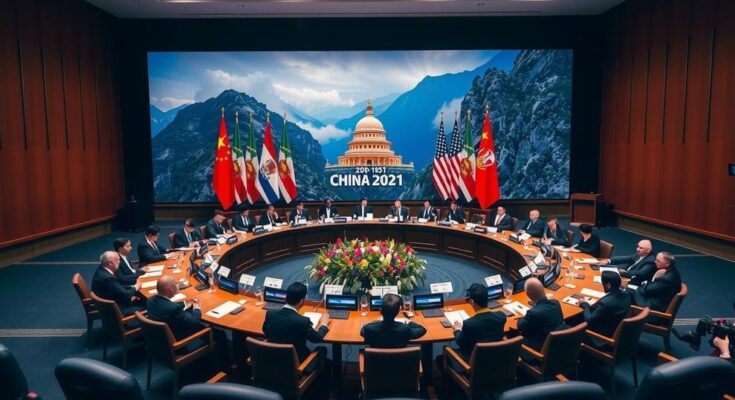At the APEC summit, President Joe Biden’s diminished presence compared to Chinese leader Xi Jinping signifies the shifting power dynamics in Latin America. Xi’s focus on strengthening China’s ties with Peru highlights Beijing’s influential economic investments in the region, contrasting with the U.S.’s faltering engagement. The summit illustrated China’s growing dominance amidst concerns regarding democratic backsliding in various Latin American nations.
During the recent Asia-Pacific Economic Cooperation (APEC) summit, President Joe Biden found himself sidelined as Chinese President Xi Jinping took center stage alongside Peru’s leader, Dina Boluarte. This summit underscored China’s rising influence in a region traditionally viewed as within the United States’ sphere of influence. Mr. Xi’s presence, bolstered by substantial investments in regional infrastructure through China’s Belt and Road Initiative, positioned him as a key figure in Latin America’s emerging landscape. Mr. Xi’s activities included inaugurating a major port in Peru and emphasizing cultural ties with the host nation, which boasts a significant Chinese population. His op-ed in a Peruvian newspaper expressed admiration for the shared historical significance between the two countries. In contrast, Mr. Biden’s role seemed almost secondary, suggesting diminished American authority in a region that has often relied on U.S. support and investment. China’s diplomatic engagement is marked by significantly increased economic investment in Latin America, totaling around $286 billion, which American leaders have struggled to counteract. As both countries vie for influence, Mr. Xi labeled the U.S.-China relationship as the world’s “most important,” stressing the need for cooperation over conflict amidst a changing global order. Moreover, Beijing’s plans to host the next APEC summit further consolidate its position of dominance.
This article reflects on the geopolitical shifts within the Asia-Pacific region, particularly the growing impact of China in Latin America. The backdrop includes past American hegemony in the region and the strategic implications of Xi Jinping’s recent engagements. The APEC summit serves as a platform for leaders to address economic collaboration, while recent tensions highlight a broader context of U.S.-China rivalry. The enduring historical and cultural connections between China and Latin American countries add another layer to this complex relationship.
In summary, the recent APEC summit highlighted China’s ascendant role in global diplomacy, particularly in Latin America, where its economic investments and cultural ties are reshaping dynamics. President Xi’s commanding presence stood in stark contrast to President Biden’s perceived sidelining, indicative of shifting power balances. These developments signal potential challenges for the U.S. in re-establishing its influence in a region where China is increasingly seen as a partner rather than a rival.
Original Source: www.telegraph.co.uk




